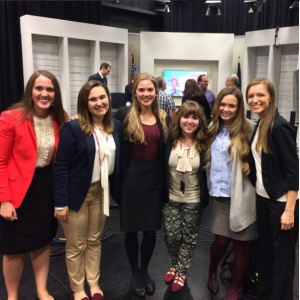Editor’s note: This story is a sidebar for a story entitled “Two female state legislators navigate landscape for women in Utah politics”.
BYU junior and political science major Rachel Finlayson is serving as the first non-founder president of a budding campus group aimed at empowering female students with political aspirations.
BYU’s Political Affairs Society acts as an umbrella over Finlayson’s non-partisan club, Women in Politics.
Women in Politics organizes events ranging from film screenings about female political figures to debate watch parties to TED-style talks with successful female professors.

“Our events are mostly centered on encouraging women to be involved in politics and to be aware and to feel validated in wanting to be involved,” Finlayson said.
At the heart of Women in Politics’ practical goals is the desire to give women a political network, Finlayson said.
But deeper down, Finlayson said, Women in Politics gives women interested in politics a home in a culture where politics isn’t the most popular female pastime.
“It’s really great that women can come to (Women in Politics) and they can talk to other women who also have thoughts and opinions and ideas on these things and can feel like, ‘OK, these are my people. We can talk about these things together. These are the people that understand me,'” Finlayson said.
Finlayson, who said she is toying with the idea of going to law school, said the group itself never encounters opposition.
“BYU is extremely supportive,” Finlayson said. “There are so many professors who have been willing to mentor me and who describe themselves as feminists — male and female professors.”
She said occasionally individual members of the club run up against social norms about women’s roles in their day-to-day conversations.
“There’s still some misinformation out there about limits on women,” she said. “‘Oh you’re worth education, but maybe not to the point of a law degree. You’re very smart and can do a lot of good, but maybe not in the public sphere.'”
Finlayson said it’s nice to have camaraderie with other women facing the same attitudes and to get the reminder from Women in Politics: “Don’t let other people tell you that you’re not qualified — that there’s something unrighteous about you wanting to be involved in politics.”

Finlayson said she thinks a college campus is the perfect place to change the tide of women in politics.
“Honestly, I feel like the women in the group are lights on campus,” Finlayson said. “People know them. People love them. They’re confident. They are faithful. They know what they’re doing.”
Women in Politics pushes its members to attend trainings on becoming more politically involved from a larger Utah group called Real Women Run.
Erin Jemison, a public policy director at YWCA and staffer for Real Women Run, said she has noticed an increase in younger women in the room at events, and she thinks it’s a direct result of the 2016 election.
“Whether or not they even necessarily were particularly upset about the outcome, I think there were a lot of close local elections in 2016 where people lost by five votes or 40 votes, and I think that just helps people see that they really can make a run for it and that their participation really does make a difference,” Jemison said.
Jemison said people sometimes accuse her group of misandrism.
“This isn’t about men being bad or about individual men getting out of office,” Jemison said. “It’s about when we have both — when we are all coming to the table and representing our communities, we come up with better solutions and make our communities better places.”
Jemison said she hopes politics can someday completely skirt issues of gender or race and focus solely on challenges that impact the population in general.
“I hope that we get to a point where we don’t have to have groups like this,” Jemison said. “There are real barriers to certain groups of people getting involved. For women, some of those barriers are getting the skills and training and honestly just encouragement to go for it. That’s what we’re trying to do — we’re trying to take down those barriers.”




